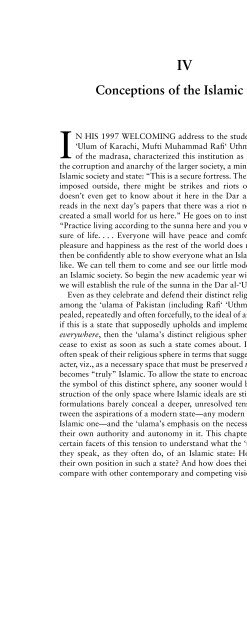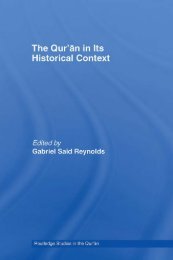- Page 4:
PRINCETON STUDIES IN MUSLIM POLITIC
- Page 8:
COPYRIGHT © 2002 BY PRINCETON UNIV
- Page 14:
ContentsFOREWORD ixACKNOWLEDGMENTSx
- Page 22:
FOREWORDhow we understand religious
- Page 34:
The Ulama in Contemporary Islam
- Page 40:
2 INTRODUCTIONformative forces of g
- Page 44:
4 INTRODUCTIONnectedness to the pas
- Page 48:
6 INTRODUCTIONA tradition consists
- Page 52:
8 INTRODUCTIONthinkers among these
- Page 56:
10 INTRODUCTIONWhile there are vary
- Page 60:
12 INTRODUCTIONhave historically po
- Page 64:
14 INTRODUCTIONThe present study bu
- Page 68:
16 INTRODUCTIONIslamist—trends,an
- Page 72:
18 CHAPTER 1rimeters by adheringto
- Page 76:
20 CHAPTER 1(or Fatawa-i ‘Alamgir
- Page 80:
22 CHAPTER 1it ready made.” 26 Th
- Page 84:
24 CHAPTER 1matters. While it is po
- Page 88:
26 CHAPTER 1judge who was not himse
- Page 92:
28 CHAPTER 1Why were the ‘ulama o
- Page 96:
30 CHAPTER 1have no effect on the m
- Page 100:
32 CHAPTER 1tutions through which t
- Page 104:
34 CHAPTER 1general (political) dim
- Page 108:
36 CHAPTER 1on its “flexibility
- Page 112:
IIConstructions of AuthorityONE OF
- Page 116:
40 CHAPTER 2she tells us little abo
- Page 120:
42 CHAPTER 2treatise, completed in
- Page 124:
44 CHAPTER 2tance in Islamic law of
- Page 128:
46 CHAPTER 2Islam, ‘Uthmani insis
- Page 132:
48 CHAPTER 2Talal Asad’s definiti
- Page 136:
50 CHAPTER 2(d. 1949) Fath al-mulhi
- Page 140:
52 CHAPTER 2of this studycircle is
- Page 144:
54 CHAPTER 2score the ‘ulama’s
- Page 148:
56 CHAPTER 2‘Uthmani—a work tha
- Page 152:
58 CHAPTER 2Karachi wrote for manyy
- Page 156:
IIIThe Rhetoric of Reform andthe Re
- Page 160: 62 CHAPTER 3Sunni Muslim states wer
- Page 164: 64 CHAPTER 3discussion on the refor
- Page 168: 66 CHAPTER 3dates is better than ca
- Page 172: 68 CHAPTER 3their uncertainties abo
- Page 176: 70 CHAPTER 3League, which sought re
- Page 180: 72 CHAPTER 3that they had studied f
- Page 184: 74 CHAPTER 3in terms not dissimilar
- Page 188: 76 CHAPTER 3drasas, continues to pe
- Page 192: 78 CHAPTER 3all aspects of human li
- Page 196: 80 CHAPTER 3That government reform
- Page 200: 82 CHAPTER 3madrasa’s learning bu
- Page 204: 84 CHAPTER 3reared in the English s
- Page 208: 86 CHAPTER 3tutes run by the Azhar
- Page 214: CONCEPTIONS OF THE ISLAMIC STATE 89
- Page 218: CONCEPTIONS OF THE ISLAMIC STATE 91
- Page 222: CONCEPTIONS OF THE ISLAMIC STATE 93
- Page 226: CONCEPTIONS OF THE ISLAMIC STATE 95
- Page 230: CONCEPTIONS OF THE ISLAMIC STATE 97
- Page 234: CONCEPTIONS OF THE ISLAMIC STATE 99
- Page 238: CONCEPTIONS OF THE ISLAMIC STATE 10
- Page 242: CONCEPTIONS OF THE ISLAMIC STATE 10
- Page 246: CONCEPTIONS OF THE ISLAMIC STATE 10
- Page 250: CONCEPTIONS OF THE ISLAMIC STATE 10
- Page 254: CONCEPTIONS OF THE ISLAMIC STATE 10
- Page 258: VRefashioning IdentitiesOLIVIER ROY
- Page 262:
REFASHIONING IDENTITIES 113nial Luc
- Page 266:
REFASHIONING IDENTITIES 115that the
- Page 270:
REFASHIONING IDENTITIES 117and its
- Page 274:
REFASHIONING IDENTITIES 119the Jam
- Page 278:
REFASHIONING IDENTITIES 121the Isla
- Page 282:
REFASHIONING IDENTITIES 123earlier
- Page 286:
REFASHIONING IDENTITIES 125Though u
- Page 290:
REFASHIONING IDENTITIES 127forging
- Page 294:
TABLE 3Notable Incidences of Sectar
- Page 298:
REFASHIONING IDENTITIES 131“trans
- Page 302:
REFASHIONING IDENTITIES 133madis an
- Page 306:
REFASHIONING IDENTITIES 135to exert
- Page 310:
REFASHIONING IDENTITIES 137more tha
- Page 314:
REFASHIONING IDENTITIES 139that the
- Page 318:
REFASHIONING IDENTITIES 141helped e
- Page 322:
REFASHIONING IDENTITIES 143Pakistan
- Page 326:
RELIGIOPOLITICAL ACTIVISM 145ofthem
- Page 330:
RELIGIOPOLITICAL ACTIVISM 147mentat
- Page 334:
RELIGIOPOLITICAL ACTIVISM 149the co
- Page 338:
RELIGIOPOLITICAL ACTIVISM 151Zeghal
- Page 342:
RELIGIOPOLITICAL ACTIVISM 153the fo
- Page 346:
RELIGIOPOLITICAL ACTIVISM 155Gulf W
- Page 350:
RELIGIOPOLITICAL ACTIVISM 157suppor
- Page 354:
RELIGIOPOLITICAL ACTIVISM 159Al-Haw
- Page 358:
RELIGIOPOLITICAL ACTIVISM 161the mo
- Page 362:
RELIGIOPOLITICAL ACTIVISM 163and th
- Page 366:
RELIGIOPOLITICAL ACTIVISM 165known
- Page 370:
RELIGIOPOLITICAL ACTIVISM 167lims a
- Page 374:
RELIGIOPOLITICAL ACTIVISM 169a bele
- Page 378:
RELIGIOPOLITICAL ACTIVISM 171eral
- Page 382:
RELIGIOPOLITICAL ACTIVISM 173fendin
- Page 386:
RELIGIOPOLITICAL ACTIVISM 175benefi
- Page 390:
RELIGIOPOLITICAL ACTIVISM 177Pakist
- Page 394:
RELIGIOPOLITICAL ACTIVISM 179standi
- Page 398:
EpilogueThe ‘Ulama in the Twenty-
- Page 402:
‘ULAMA IN THE TWENTY-FIRST CENTUR
- Page 406:
‘ULAMA IN THE TWENTY-FIRST CENTUR
- Page 410:
‘ULAMA IN THE TWENTY-FIRST CENTUR
- Page 414:
‘ULAMA IN THE TWENTY-FIRST CENTUR
- Page 418:
‘ULAMA IN THE TWENTY-FIRST CENTUR
- Page 424:
194 NOTES TO INTRODUCTION6. Olivier
- Page 428:
196 NOTES TO INTRODUCTION26. Martha
- Page 432:
198 NOTES TO INTRODUCTIONbetween Gl
- Page 436:
200 NOTES TO CHAPTER 1The Education
- Page 440:
202 NOTES TO CHAPTER 116. ‘Alamgi
- Page 444:
204 NOTES TO CHAPTER 1ing industry
- Page 448:
206 NOTES TO CHAPTER 1but probably
- Page 452:
208 NOTES TO CHAPTER 289. Khaled Ab
- Page 456:
210 NOTES TO CHAPTER 2ma‘at-i Ahl
- Page 460:
212 NOTES TO CHAPTER 252. Education
- Page 464:
214 NOTES TO CHAPTER 2Fattah Abu Gh
- Page 468:
216 NOTES TO CHAPTER 3popular cultu
- Page 472:
218 NOTES TO CHAPTER 3Lynn Zastoupi
- Page 476:
220 NOTES TO CHAPTER 352. See Shibl
- Page 480:
222 NOTES TO CHAPTER 3the country
- Page 484:
224 NOTES TO CHAPTER 3“separation
- Page 488:
226 NOTES TO CHAPTER 4Press, 2001).
- Page 492:
228 NOTES TO CHAPTER 4we would have
- Page 496:
230 NOTES TO CHAPTER 456. Talal Asa
- Page 500:
232 NOTES TO CHAPTER 5Outline of Hi
- Page 504:
234 NOTES TO CHAPTER 534, 38, 39, 4
- Page 508:
236 NOTES TO CHAPTER 553. Cf. Nasr,
- Page 512:
238 NOTES TO CHAPTER 577. Keddie, I
- Page 516:
240 NOTES TO CHAPTER 5101. Mawlana
- Page 520:
242 NOTES TO CHAPTER 5Mawlana Sami
- Page 524:
244 NOTES TO CHAPTER 5146. Dawn, Ap
- Page 528:
246 NOTES TO CHAPTER 67. Moustafa,
- Page 532:
248 NOTES TO CHAPTER 646. This info
- Page 536:
250 NOTES TO CHAPTER 683. By the sa
- Page 540:
252 NOTES TO CHAPTER 6tacitly agree
- Page 544:
254 NOTES TO EPILOGUEsity are publi
- Page 548:
256 NOTES TO EPILOGUEtence on a uni
- Page 554:
Glossaryadab — Belles lettres, li
- Page 558:
GLOSSARY 261Maliki — A school of
- Page 562:
Bibliography‘Abd al-Sattar. Ta’
- Page 566:
BIBLIOGRAPHY 265Benton, Laura. “C
- Page 570:
BIBLIOGRAPHY 267Donner, Fred M. Nar
- Page 574:
BIBLIOGRAPHY 269Gangohi, Rashid Ahm
- Page 578:
BIBLIOGRAPHY 271———. Partners
- Page 582:
BIBLIOGRAPHY 273Johansen, Baber. Co
- Page 586:
BIBLIOGRAPHY 275———. Shatteri
- Page 590:
BIBLIOGRAPHY 277Memon, Muhammad Uma
- Page 594:
BIBLIOGRAPHY 279———. Ma‘ari
- Page 598:
BIBLIOGRAPHY 281———. “Perso
- Page 602:
BIBLIOGRAPHY 283Thanawi, Ashraf ‘
- Page 606:
BIBLIOGRAPHY 285Wensinck, A. J., et
- Page 610:
Index‘Abd al-Rahman, ‘Umar, 148
- Page 614:
INDEX 289ists, 7-10; and the‘ulam
- Page 618:
INDEX 291Nu‘mani, Muhammad Manzur
- Page 622:
INDEX 29339, 97-99; and Indonesian



